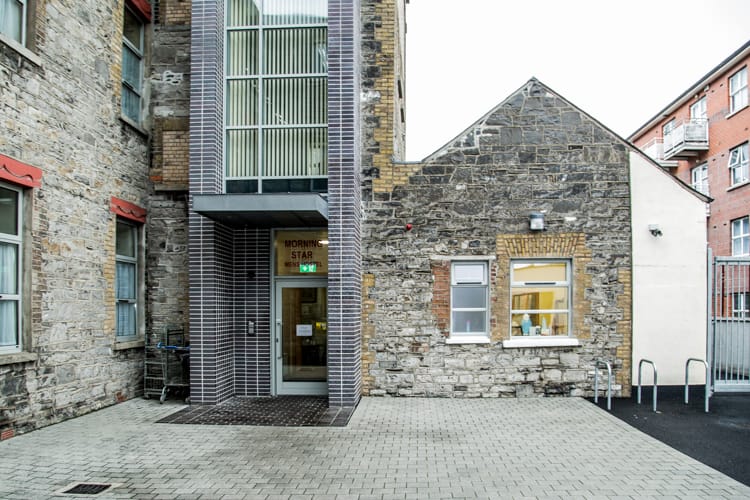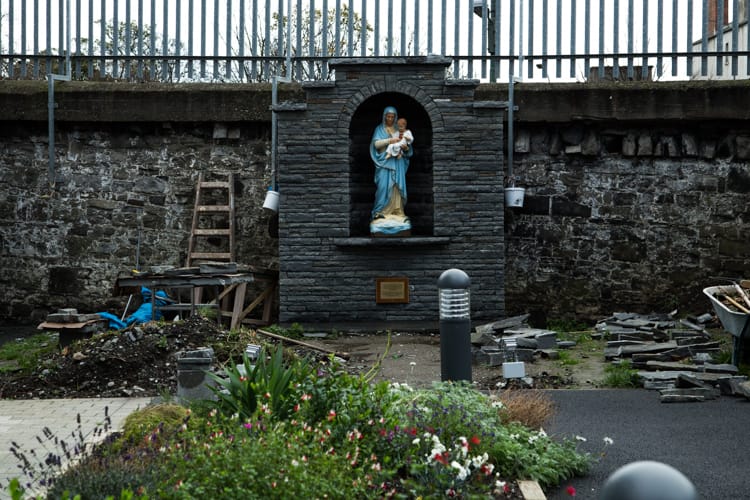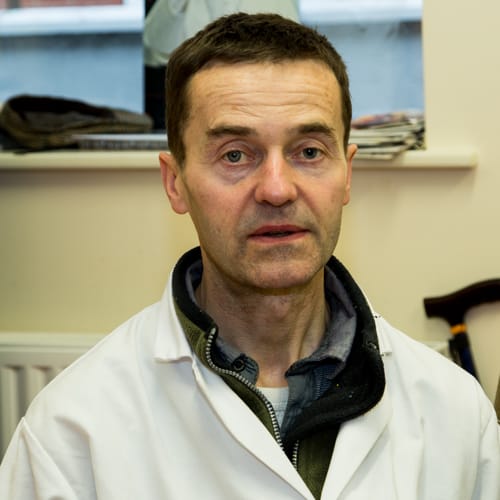What’s the best way to tell area residents about plans for a new asylum shelter nearby?
The government should tell communities directly about plans for new asylum shelters, some activists and politicians say.
Homeless men in Dublin used to ask to be sent anywhere but the Morning Star Hostel. Today, it’s a different place.

In years gone by, when the homeless men of Dublin went to charities such as St Vincent de Paul looking for a hostel bed for the night, they would make one request: “Send us anywhere but the Morning Star,” says Michael Murphy.
Murphy, who’s been volunteering at the Morning Star Hostel for 40 years and who is a full-time resident at the hostel, says it used to be a rough place. There were often fights among the men, which at times flared into riots.
Fortunately, this is no longer the case.
The Morning Star, located in a late 19th-century grey limestone three-storey on Morning Star Avenue, just off North Brunswick Street, is now an exemplar of what a shelter for homeless people could or should be.
Refurbished in 2008, the hostel has four large, clean dormitories, which cater for 63 men. There are ample toilet and shower facilities, and there is a large dining hall, serviced by a state-of-the-art kitchen of which any hotel or restaurant would be proud, envious even.
The hostel also boasts a television area, chill-out and reading areas with plenty of reading
material, a games room which houses three full-sized snooker tables, a pool table, and a table-
tennis table. There’s also a large chapel and a landscaped garden with a pond and a grotto where residents can read and relax when the weather is decent.
The Morning Star, which opened in 1927, is one ofthe longest-running hostels in the city. It is not government funded, run by the Legion of Mary, a lay association of the Catholic Church.
It would not exist without the dedication of volunteers, five of whom are full-time residents, some of whom I caught up with last Thursday afternoon in the staff canteen.
Willie Burke’s been volunteering at the Morning Star for eleven years and is now a full-time resident, an “indoor brother”. Any member of the Legion is referred to as a “brother” or “sister”.
“It keeps me on the straight and narrow, keeps me focused on doing positive things,” says Burke.
He used to work in construction and sometimes he’d be out of work for months at a time. “You’d get kind of depressed,” he says.
“With this, you’re doing positive things all the time. You’re helping people, and it’s very rewarding,” he says.
Residents, once admitted, can stay as long as they like, Burke says. As long as they don’t make life difficult for other residents, the hostel can be their home.
“We try to make a family atmosphere here,” he says.
While staying is an option that is open to the men, the volunteers also encourage them to take up courses in computers, music or cooking, with the goal of getting them back on their feet and possibly getting them back into independent living.
Matt Webb, another indoor brother, says the hostel “has a good turnover, with lads coming in for a few months and then moving on”.
Others, he says, have been there for ten, fifteen years. It’s their home.
Webb, a short, affable man with thin hair, is the Morning Star’s maintenance man.
He’s also the Star’s top recruiter of volunteers, and, while chatting to him, I get the feeling he’s trying to recruit me.
I’m not alone in thinking this; the other men around the table point this out and have a good laugh about it.
One of them is Brian Byrne. A semi-retired carpenter, he’s been volunteering at the hostel for more than two years.
Like most of the volunteers, he’s part-time. He comes in one, two evenings a week, he says. “But I’ve been in more in the last few months.”
Byrne built the impressive stone grotto of the Virgin Mary in the garden of the hostel. He’ll be teaching the men carpentry in the proposed men’s shed, which is to open in the coming months.
The ethos of the Morning Star as not just a shelter for homeless men but a place in which they can develop and build up their self-esteem by learning new skills, working, and engaging with the volunteers, stems from its founder, Frank Duff.
The eldest of seven, Duff was born into a middle-class family in 1889. Upon leaving Blackrock College he became a civil servant in the Land Commission. After independence, he served very briefly as secretary to Michael Collins, possibly for as little as three days, according to his biographer, Finola Kennedy. After that, in 1924, he joined the Department of Finance.
But he was also a great advocate for the impoverished of Dublin, having joined the St Vincent de Paul in 1913.
Volunteering with the charity, he devoted his spare time to the city’s homeless, its sick, and its prostitutes. One of the founding members of the Legion of Mary in 1921, he helped start the Legion’s first hostel for prostitutes three years later, at 76 Harcourt Street: the “Santa Maria”.
In an effort to tackle the rampant poverty of Dublin in the years following independence, the government in 1926 established a commission to investigate the conditions of the poor.
Duff submitted to the commission a detailed analysis of the dreadful conditions of lodging houses and of the lives of “down and outs”, as well as proposals to alleviate the situation, according to Kennedy’s essay, “Frank Duff’s Search for the Neglected and Rejected“.

He called for the establishment of a hostel, to be staffed by volunteers and attached to a firewood yard, where the men could chop wood and sell bundles of kindling door to door to pay for their keep.
Duff’s proposal was accepted.
He was given the use of a large, vacant building on Morning Star Avenue, formally a workhouse throughout the 19th century, and, during the War of Independence, the headquarters of the Black and Tans.
The Morning Star Hostel opened on 25 March 1927. It hasn’t closed its doors since.
Duff’s plan for the men to sell kindling also came to fruition. The stick yard, opposite the hostel, was fed with worn railway sleepers donated from nearby Broadstone railway station.
The men of the hostel would cut the sleepers, and then split them into kindling. This they would wrap into bundles and sell door to door.
As well as providing an opportunity for the men to pay their ways and pocket some money for themselves, the work kept their minds focused, their spirits up, and, in some cases, acted as a bridge to further employment.
Unlike today’s limit of 63 residents, back then there were up to 200 men staying each night. When the weather was particularly bad, it was as many as 250.
And with the Morning Star’s unconditional open-door policy, fights and riots were not uncommon.
Indoor Brother Murphy remembers Tom Doyle, who managed the hostel for 50 years up until 1988, receiving a phone call from a priest appealing on behalf of a man who’d been barred from every hostel in Dublin and had no home to go to.
To which Doyle replied, ‘Send him up here, he’s one of us,’ Murphy says.
Murphy remembers one particular riot. “There were about 20 fellas fighting in the dining hall. Tom Doyle used to just stand at the kitchen door with a pot of tea in his hand,” he says.
Someone had called the Gardai about this riot going on in the Morning Star, he says.
“The cops came up. When they got into the dining hall there was only Tom Doyle there with his teapot,” he says. “The police said, ‘Where’s this riot?’ Tom said, ‘Ah, they’re gone to bed.’”
There were all sorts of characters here, says Murphy. “Good characters, as well as fellas who would cut your throat.”
Today, with fewer residents, there’s a much more convivial and communal atmosphere.

In each of the four bright, spacious dormitories, the men are encouraged to look out for one another. Each cubicle, which has a bed, a wash basin and wardrobes, has a waist-high wall looking onto the corridor. This is to ensure that the men can see if their neighbours are okay, says Indoor Brother Burke.
If one of the lads comes in with a few on him, the others can make sure he’s lying on his side, he says.
One resident, Gerry, whose surname can’t be published because of the Morning Star’s strict policy on confidentiality, describes the hostel as a sanctuary.
This is his third stint at the Morning Star. He first came to stay here 15 years ago, when he’d separated from his wife, had no job and no money.
He’s been here for two months now.
Gerry, a short man with a neat salt-and-pepper moustache, dressed in dark trousers and a cream diamond-patterned jumper, is a man who likes his own space, and the hostel provides him with that, he says.
“When I’m on my own, I never had a problem. The problem is other people. It’s taken me 20 years to figure that out,” he says.
Still, he gets on with everybody at the Star, he says.
“I don’t mind it here,” he says. “There’s always different things to do.”
He likes to go into the chapel and say a few prayers, but he’s not religious, he says.
“I believe in God,” he says. “But God is not religious or never will be. Only people are religious.”
He doesn’t know how much longer he’ll stay here, but has no plans yet to leave.
Neither does John, one of the newest residents at the Morning Star, who I get chatting to in the dining hall, where the men eat their breakfast and dinner.
He’s been here about a month now, he says. He likes it; the food is good and the people are nice, he says.

John was familiar with the Morning Star and the Legion and played in several of the football matches the hostel organises annually.
He’d be a good asset to have on your team, given that he says he played outside right for Saint Patrick’s Athletic in the 1970s. He was there when Barry Bridges played for the club, as well as for Terry Venable’s brief spell.
“Packed it in when me aul’ knee went,” he says. “Ligaments and cartilage.”
He spent most of his working life as a labourer on building sites, but the 62-year-old has been out of work for a few years now.
He’d been living in a friend’s house out in Sandymount for the last six years.
“He met this bird, starting seeing her on and off,” he says. They were on and off for a year or so, but then they were just on, and she was moving in with John’s friend.
“I had to go,” he says. “That’s obvious, isn’t it? Too many chickens spoil the broth.”
Before getting a place at the Morning Star, he slept rough for three nights down by Heuston Station.
“The weather was mild,” he says. “It was warm.”
But he was worried he wouldn’t get a bed in the city and was grateful to get one in the Morning Star.
A big Spurs fan, he gets to watch Match of the Day on Saturday and Sunday nights, as well as the midweek Champion’s League matches, on the big television at the far end of the dining hall.
He plays pool in the games room, which is just next door, and takes advantage of the many books available at the hostel.
From 11am, the men leave the hostel so that the volunteers can clean up and get things in order and get the dinner ready for the coming night. The men are allowed to return at 5.30pm.
If the weather is particular bad or if someone is sick they don’t have to leave.
To keep himself busy in the hours outside the hostel, John says he walks a lot.
On nice days, he’ll stroll out towards Sandymount, stop off at the Merrion Gates crossing, and watch the ships come in.
Other days, he visits the Ilac Centre library to read the papers, or he might visit a museum. Collins Barracks and IMMA are favourite haunts.
“Keep meself active and me mind,” he says. “I’ll back an aul’ horse now and then.” Sometimes he wins.
Occasionally, he’ll meet up and go for a pint with friends or, as he calls them, acquaintances.
“You never have friends, you have acquaintances,” he says.
In the staff canteen, Des Kelly (yes, of Des Kelly Carpets), president of the Morning Star presidium, is discussing the case of a resident with Brother Burke.
The resident, who suffers from alcoholism, had been sober for months after the Morning Star got him on a detox programme. But a few days ago the man had a bad fall and was taken to James’s hospital.
Apparently, he did a “bunk” yesterday from the hospital and “gone out got a bit of drink”, Burke says. “A nurse rang, says he’s on the couch, conked out, with whatever he took.”
Burke and Kelly are organising someone to go and collect the man from the hospital.
It’s a reminder that while the hostel has come a long way from the bad old days of “anywhere but the Morning Star”, many of the men are coming from troubled backgrounds.

About 50 percent of the men have an addiction, says Kelly, who’s been volunteering at the Star for 14 years.
“Some suffer with depression, are separated or come from broken homes. They need a break,” he says.
The hostel’s policy is to forgive the men for making mistakes. If you get barred from the Star, you’re not barred for life.
“If you do go around and assault somebody or vandalise the place, you might be put out for a while,” Burke says. “But you’re not barred for life. You can always come back and plead your case.”
“We all make mistakes in life,” he says.
A couple of months ago, Burke was assaulted by one of the residents, an ex-soldier.
The man had left the hostel that morning and didn’t return before the 11pm curfew. He arrived back between midnight and 1am, after having a few.
“He got in over the wall and was trying to break into the place,” Burke says. “I heard him and went down.”
“He had a big bar in his hand. It could’ve ended up very badly, but it didn’t thank God, and I managed to get him out. He was barred for a couple of weeks, but I haven’t seen him since.”
The man goes out with a woman and she’s a very bad influence on him, he says. She’s a heavy drinker.
“When he first came in here, he was off the drink, and we managed to keep him off it for eight months. We got him a job and he was doing great, but he fell back with the girl. The drinking got heavier and heavier.
“It started off one day and it went two days, three days,” he says. “He ended up losing his job over it, the whole lot.”
Brother Byrne says the man is a smashing lad when he’s off it.
“The demon drink,” Kelly says.
When the issue of the assault on Burke came up at Morning Star’s weekly meeting the following Monday, Byrne says, Burke was the first person to ask for the man to be allowed back into the hostel.
This is typical of the volunteers who’ve devoted their time and, in some cases, their lives to the Morning Star, and it goes right back to the ethos of the hostel’s founder, Frank Duff, which he set down in his 1916 pamphlet, “Can We Be Saints“?
In the section on the secret of influencing others, he writes, “There is an art in the moving of others, and those that work for their neighbours must study it.”
To master this art, he writes, “follow this simple rule – Look only for good qualities in anyone you meet; you will find them.”
This rule has been the foundation which has kept the Morning Star standing and open for almost 90 years, and is as strong today as it was in 1927.
“The brothers here see good in everybody,” says Brother Kelly.
Get our latest headlines in one of them, and recommendations for things to do in Dublin in the other.